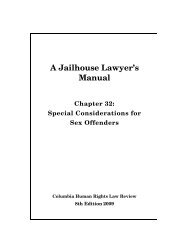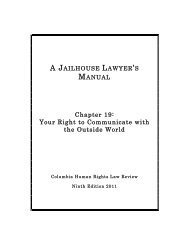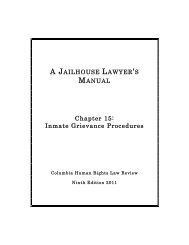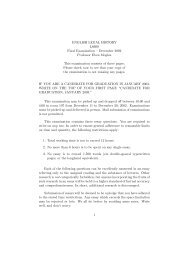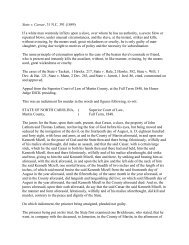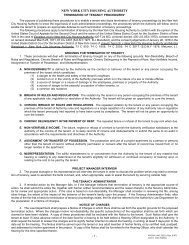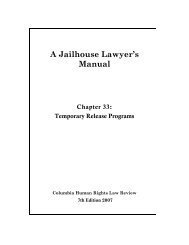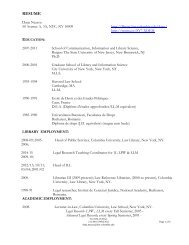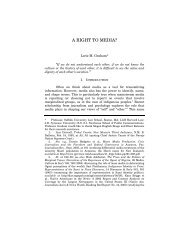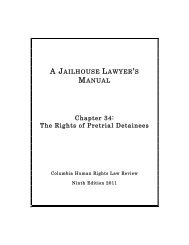The Right to Dignity Rex D. Glensy - Columbia Law School
The Right to Dignity Rex D. Glensy - Columbia Law School
The Right to Dignity Rex D. Glensy - Columbia Law School
Create successful ePaper yourself
Turn your PDF publications into a flip-book with our unique Google optimized e-Paper software.
2011] <strong>The</strong> <strong>Right</strong> <strong>to</strong> <strong>Dignity</strong> 77<br />
that his influence on the United States was less potent. Nevertheless,<br />
a notion of the dignity of humans and how it should impact the<br />
interaction of individuals and the state did occupy the thoughts of<br />
prominent thinkers at the dawn of the new republic. For example,<br />
Thomas Paine eloquently invoked the “natural dignity of man” as the<br />
reason <strong>to</strong> protect individual rights that transcend authoritative rule. 61<br />
Paine’s conception of dignity marked a distinct break from the British<br />
rule where dignity had more of an ancient Roman connotation and<br />
was reserved for the nobility or aris<strong>to</strong>cracy. Thomas Jefferson and<br />
Alexander Hamil<strong>to</strong>n shared Paine’s views. 62<br />
<strong>The</strong> idea of dignity does appear in <strong>The</strong> Federalist Papers, and<br />
seems initially <strong>to</strong> have a central position: the very first paper<br />
authored—not coincidentally, by Hamil<strong>to</strong>n—urges the adoption of the<br />
new Constitution in order <strong>to</strong> ensure the “liberty,” “dignity,” and<br />
“happiness” of the citizenry. 63 Of course, two of these three values<br />
survive in<strong>to</strong> the Preamble of the Constitution; “dignity” is left out.<br />
Following this Kantian usage of the term, the concept of dignity in<br />
<strong>The</strong> Federalist Papers then morphs in<strong>to</strong> the ancient Roman<br />
connotation. 64 Although referred <strong>to</strong> slightly more than a dozen times,<br />
after the initial reference, the authors of <strong>The</strong> Federalist Papers then<br />
use the term <strong>to</strong> denote the status of an office holder or his inherent<br />
authority, implying that dignity is not an inherent attribute, but one<br />
that is acquired. 65 For example, the authors argue that there can be<br />
only one chief executive because if more than one was “clothed with<br />
equal dignity and authority,” it would lead <strong>to</strong> institutional<br />
61. Thomas Paine, <strong>Right</strong>s of Man 41 (Gregory Claeys ed., Hackett Pubs.<br />
1992) (1791). Thomas Paine’s statement echoed that of the Declaration of the<br />
<strong>Right</strong>s of Man and of the Citizen that was put forward during the French<br />
Revolution. See Declaration of the <strong>Right</strong>s of Man and of the Citizen art. 6 (1789)<br />
(stating that “[l]aw is the expression of the general will” and that “all citizens<br />
[are] equal.”).<br />
62. See, e.g., Gregory Claeys, Introduction, in Thomas Paine, <strong>Right</strong>s of Man<br />
xvii (Gregory Claeys ed., Hackett Pubs. 1992) (1791) (noting Jefferson’s general<br />
positive reception <strong>to</strong> Paine’s views in <strong>The</strong> <strong>Right</strong>s of Man). Of course their<br />
purported belief did not quite translate in<strong>to</strong> a governmental structure that<br />
followed through on this idea. Others, close <strong>to</strong> the time, have noted this<br />
incongruity. See, e.g., Simón Bolívar, Message <strong>to</strong> the Congress of Bolivia (May 25,<br />
1826), in His Basic Thoughts 147–48 (Manuel Pérez Villa ed., 1981) (calling<br />
slavery a “shameless violation of human dignity.”).<br />
63. <strong>The</strong> Federalist No. 1, at 4 (Alexander Hamil<strong>to</strong>n) (Clin<strong>to</strong>n Rossiter ed.,<br />
1999).<br />
64. See Englard, supra note 22, at 1904; Cancik, supra note 46, at 19.<br />
65. Of course, contrary <strong>to</strong> ancient Rome, the dignity of the office can be<br />
generally achieved through achievement rather than through birthright.



